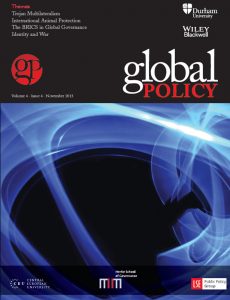To the left, to the left; everything you know in a box to the left… Bias in the media?
 by enteringthewhirlpool
by enteringthewhirlpool
The tendency of people to perceive media sources as biased against their own viewpoints has been well documented. The bias can take the form of omission, where relevant facts, perspectives and arguments are not conveyed to the viewer. An example of this would be the Daily Show. A typical reaction of a social democrat (I refuse to use the word ‘liberal’ in this context, as it has a perfectly good alternative, distinct and historical meaning) to the show would be to laugh at the fact that the conservative arguments mentioned on the show are so bad. The typical reaction of a conservative would be annoyance that stronger conservative arguments are not presented on the show.
Perhaps a more serious type of media distortion is when news stories are consciously manipulated to fit an agenda. Recent examples include MSNBC doctoring a video so that what would otherwise contradict the hypothesis mooted on the show in question, that to oppose Obama’s healthcare reform bill you must be white and bigoted, becomes instead evidence shown to support the hypothesis. On the other side of the ideological divide, Fox News is often accused of having a conservative bias.
Anand, Tella & Galetovic (2007) argue that media bias should be perceived where the information concerned is non-verifiable. The information in the example above was verifiable, but verification required effort that not all viewers would have been willing to take. Gunther & Schmitt (2006) propose that perceptions of media bias are more likely to exist when the observer of the bias thinks that the information in question will be widely disseminated. This ties in with the third-person effect whereby people perceive others to be more influenced by biased information than they themselves are (Davison, 1983).
In which direction (on a simple left-right scale) would we expect the most media bias? Well, firstly we might expect more bias overall as news provision has become more disaggregated with the rise of cable TV and the internet. Secondly, the graph shown here by Charles Murray would imply that we might expect mainstream media outlets to promote views to the left of the population as a whole.
 Read More: The Impact of Individual and Interpersonal Factors on Perceived News Media Bias
Read More: The Impact of Individual and Interpersonal Factors on Perceived News Media Bias
 Read More: Mapping Boundaries of the Hostile Media Effect
Read More: Mapping Boundaries of the Hostile Media Effect
 Read More: Information or Opinion? Media Bias as Product Differentiation
Read More: Information or Opinion? Media Bias as Product Differentiation




1467-7660/asset/DECH_right.gif?v=1&s=a8dee74c7ae152de95ab4f33ecaa1a00526b2bd2)

1-msnbc used the video to make the point that those bringing the weapons have been predominantly white, and the race of the specific individual on screen matters little. it means more to journalistic ethics than the epistemic concerns you raise here. msnbc did not even attempt to verify the overall racial makeup of gun-toters, and thus cannot really be accused of doctoring evidence.
2-interesting that you used a graph from a conservative think tank to illustrate why the media is liberal. doesnt your post predict this bias? i’d imagine liberals have reasons to predict the opposite….
1- In all other versions of the video I have seen the race of the chap with the gun is obvious. It certainly looks as if MSNBC has specifically edited it for the purpose of hiding this fact. I had another example of media bias which was Fox’s use of inaccurately dated healthcare stats relating to the NHS in the UK. However, I fact-checked this one and it turned out that they did give accurate dates on the information after all. I didn’t have time to look for a second example.]
I had another example of media bias which was Fox’s use of inaccurately dated healthcare stats relating to the NHS in the UK. However, I fact-checked this one and it turned out that they did give accurate dates on the information after all. I didn’t have time to look for a second example.]
[In the interests of being ‘fair and balanced’
2a – I would never suggest that the US media is liberal (as this would confuse any readers in the UK or continental Europe).
2b – Murray’s graph, which I think is from a forthcoming book of his, shows that what he classifies as “intellectual upper” – people with grad degrees and high incomes have become more left-wing (liberal in the US sense) as other groups have become more conservative. As large numbers of people in media will be drawn from this group you might therefore anticipate that the media will have a leftwards bias compared to the overall population.
nb. The graph in question refers only to non-Latino whites ages 30–49 and thus is highly imperfect for the use I make of it. However, I recall reading other sources that suggest that people with more formal education in the US tend to be more left-wing in their opinions.
2c)
This seems to be an interesting piece of data crunching. It isn’t liberal-conservative, but rather Democrat-Republican & it shows a movement over the last three decades of intelligent people away from the Republicans and towards the Democrats:
http://www.halfsigma.com/2006/06/democrats_may_n.html
yes, true, you are in good standing regarding those assertions. there is a whole literature in history, psychology and sociology (and probably more, but these i know a bit more) regarding intellectualism/openness to ideas and experience/etc being correlated with being on the left. i should admit, my master’s thesis was on anti-intellectualism and political orientation. haha ~nathan
Sounds like a fun thesis topic. Anecdotally I’d say that most of the smart people I’ve met have been left wing. I’d also say that most of the very smart people I’ve met have been right wing (conservative or libertarian). As an epicurean I certainly find the arguments on the right more satisfying (I suspect that numerical dominance in the academy has not done the left any favours).
It seems important to me that this is a discussion of viewer’s opinions about media bias. That is not–in itself–evidence of actual media bias. What assumptions does this focus on opinions imply about media accuracy, which might be another side of the coin?
Keri
enteringthewhirlpool : though, i’d like to distinguish between “smart” and intellectual. computers are very smart. hofstadter, in his book on anti-intellectualism in american life, distinguished this as intelligence (“smart”) versus intellectualism. ~nathan